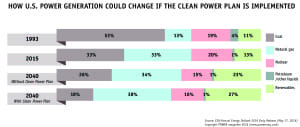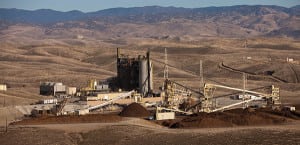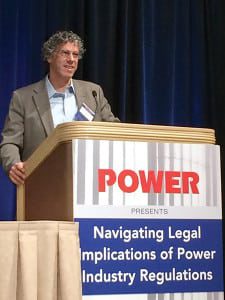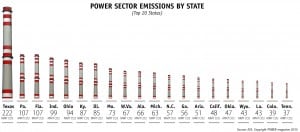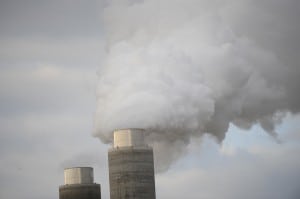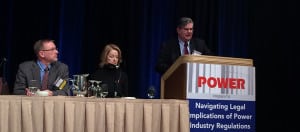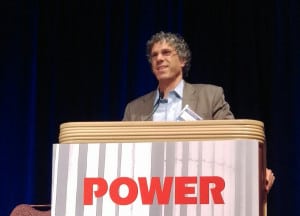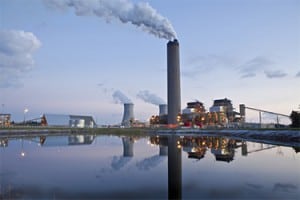Clean Power Plan
-
Legal & Regulatory
EIA: Clean Power Plan Will Wallop Coal Power Generation
Even if the final Clean Power Plan is not implemented, U.S. electricity-related carbon dioxide (CO2) emissions will remain well below 2005 levels, the Energy Information Administration (EIA) said in a comparison of two cases looking forward through 2040. The cases are part of the agency’s May 17–released Annual Energy Outlook 2016 Early Release (AEO2016 Early […]
-
Legal & Regulatory
D.C. Circuit Delays Clean Power Plan Case Hearing by Months, Opts for En Banc Review
Oral arguments to assess the merits of the Clean Power Plan will now take place before a nine-judge panel at the U.S. Court of Appeals for the District of Columbia Circuit on September 27, bypassing review of challenges to the Environmental Protection Agency’s (EPA’s) controversial rule by a three-judge panel that was originally scheduled to […]
-
Coal
ERCOT: Uncertainty Increased in 10-Year Outlook
Uncertainty concerning a number of environmental rules is clouding planning measures, the Electric Reliability Council of Texas (ERCOT) said on May 3. Citing its latest Capacity, Demand, and Reserves (CDR) report—a snapshot of existing and planned resources and load forecasts for the next 10 years—the grid entity that manages about 90% of Texas’ electric load […]
-
Renewables
Environmental Experts Underscore Clean Power Plan Uncertainty
Even if the Clean Power Plan (CPP) doesn’t overcome legal challenges, it is likely that many states will implement carbon-curbing measures set down by the rule, some panelists said at the Environmental Mega Session at the ELECTRIC POWER 2016 conference in New Orleans on April 19. The Rule’s Shaky Legal Standing The rule is […]
-
Legal & Regulatory
Clean Power Plan Backers Petition Court in Support of EPA
A diverse coalition of major investor-owned utilities, public power authorities, and one of the largest independent power producers, as well as a combination of cities and states, clean energy groups, and environmental groups, filed briefs with the D.C. Circuit Court of Appeals in support of the Environmental Protection Agency’s (EPA’s) Clean Power Plan. The involved […]
-
Legal & Regulatory
Chief Justice Roberts Rejects Bid to Suspend MATS Rule
U.S. Supreme Court Chief Justice John Roberts rejected the plea of 20 states to stay the Environmental Protection Agency’s (EPA’s) Mercury and Air Toxics Standards (MATS) rule while the agency works to comply with a previous ruling. Michigan Attorney General Bill Schuette had requested the stay to pause any further action to implement the rule […]
-
Renewables
Xcel Energy: Committed to Renewables, but Going Its Own Way
Utility holding company Xcel Energy, headquartered in Minneapolis and with large electric and gas operations in eight states in the upper Midwest, the Rocky Mountain West, and Texas, has ambitions to be the
-
Power
Why the Clean Power Plan Needs a Dynamic Reliability Safety Valve
John J. Novak The U.S. Environmental Protection Agency’s (EPA’s) Clean Power Plan is arguably the most ambitious and far-reaching regulation in the agency’s history. America’s electric cooperatives
-
Legal & Regulatory
Twenty States Call on Supreme Court to Stay EPA Mercury Rule
Rallied by the Supreme Court’s unprecedented stay of the Environmental Protection Agency’s (EPA) Clean Power Plan, a coalition of 20 states has asked the high court to stay another disputed agency rule: the Mercury and Air Toxics Standards (MATS). The states are: Alabama, Alaska, Arizona, Arkansas, Idaho, Iowa, Kansas, Kentucky, Michigan, Mississippi, Missouri, Nebraska, North […]
-
Legal & Regulatory
EPA Chief: Clean Power Plan to Win on Merits
Despite the unprecedented stay by the Supreme Court, the Environmental Protection Agency’s (EPA’s) Clean Power Plan will withstand legal challenges “based on its merits,” predicted the agency’s head, Gina McCarthy, at the IHS CERAWeek conference in Houston. McCarthy discussed the plan and other recent initiatives to stem greenhouse gas emissions—including recently announced rules to curb […]
-
Legal & Regulatory
EPA, DOE Experts Upbeat on Regulatory Agenda
The Environmental Protection Agency’s (EPA’s) acting administrator of the Office of Air and Radiation, and the Department of Energy’s (DOE’s) head of clean coal and carbon management gave upbeat assessments of the Obama administration’s regulatory agenda and power sector priorities speaking at the EUEC 2016 conference in San Diego on February 3. Janet McCabe of […]
-
Renewables
CHP Update: Policies, Partnerships, and Challenges
Combined heat and power (CHP) is hot again—in more ways than one. After a surge in capacity during the 1980s, kick-started by the 1978 federal Public Utility Regulatory Policies Act (PURPA) that was designed
-
Legal & Regulatory
Navigating Legal Implications of Power Industry Regulations
A summary of POWER’s legal affairs conference on power industry regulations.
-
Legal & Regulatory
[UPDATED] Halt the EPA’s Clean Power Plan Now, 26 States Urge Supreme Court
Following the D.C. Circuit’s denial of motions for stay, 26 states have petitioned the U.S. Supreme Court to immediately block the Environmental Protection Agency’s (EPA’s) contentious Clean Power Plan from taking effect. The January 26 application, directed to Chief Justice John Roberts Jr., notes that the states filed petitions for review of the carbon rule […]
-
Legal & Regulatory
D.C. Circuit Denies Stay of Clean Power Plan
A federal court has denied the motions for stay requested by 27 states and numerous industry groups to block the Clean Power Plan from taking effect. “Petitioners have not satisfied the stringent requirements for a stay pending court review,” the court said in its two-page order on January 21. The court also ordered that consideration of the […]
-
Commentary
Clean Power Plan Means Opportunities for Power Plants
The U.S. Environmental Protection Agency (EPA) published the final version of the Obama administration’s Clean Power Plan (CPP) on Oct. 23, 2015, and within hours more than two dozen challenges were filed
-
Legal & Regulatory
The Generating Company Challenge: Manage Change While Maintaining Reliability
In mid-November, current members of POWER’ s Generating Company Advisory Team responded by email to a set of questions about their concerns, challenges, and new initiatives as they plan for the year ahead
-
Legal & Regulatory
THE BIG PICTURE 2015: The Year in Power Sector Infographics
POWER‘s monthly infographic sheds light on power sector trends globally, and in 2015, it highlighted changes in plant retirements, sector revenues, rule costs, workforce, emissions technologies, and electricity costs, among other subjects. January 2015: Baseload Retirements How coal plant retirements compare with retirements of other baseload generation sources. February 2015: Power Revenues How revenues for fossil power […]
-
Legal & Regulatory
Obama Vetoes Resolution to Stop Clean Power Plan
As expected, President Obama vetoed two resolutions on Dec. 18 that would have blocked the Environmental Protection Agency’s (EPA’s) rules on CO2 emissions and halted the administration’s Clean Power Plan. Senate Joint Res. 23 was Congress’ attempt to nullify the EPA’s greenhouse gas (GHG) emissions standards for new, modified, and reconstructed power plants, while Senate […]
-
Legal & Regulatory
COP21 Climate Deal Draws Praise, Fire
Delegates of 195 nations, including the U.S., on Dec. 12 reached a landmark deal at the Paris COP21 conference that commits the world to reducing greenhouse gas (GHG) emissions in an effort to combat the effects of climate change. Though scientists have said global temperature increases need to kept below 2 degrees C to avoid […]
-
Legal & Regulatory
AEP to Withdraw From ALEC, Cut Funding for Clean Coal Coalition
American Electric Power (AEP), one of the biggest coal generators in the U.S., is withdrawing funds and staff resources from heavy lobbying efforts against the Clean Power Plan, sinking them instead into preparations for compliance with the controversial climate rule. The company has informed the American Legislative Exchange Council (ALEC) that it will not be […]
-
Legal & Regulatory
Political Opposition to Clean Power Plan Looms Large, Experts Say
The Environmental Protection Agency’s (EPA’s) Clean Power Plan (CPP) is likely to be complicated at least as much by political and legal opposition as by technological challenges in reducing carbon emissions, several speakers at POWER magazine’s inaugural conference on legal issues in the generation industry noted on Dec. 7 in Las Vegas. “Navigating Legal Implications of […]
-
Legal & Regulatory
Climate Change Litigation: Implications for States and Power Generators
Climate change litigation in the U.S. has far outpaced climate litigation in any other jurisdiction. In fact, according to Teri Donaldson, partner with DLA Piper, more lawsuits concerning climate change have been decided or settled in the U.S. than in the rest of the world combined. “The success rate in these cases is very low,” […]
-
Legal & Regulatory
Don’t Fear the Clean Power Plan, Chief EPA Lawyer Says
The power sector should view the Environmental Protection Agency’s (EPA’s) recent drive to tighten regulations on air and water emissions as an opportunity to improve its efficiency and environmental footprint rather than as an obstacle, said EPA General Counsel Avi S. Garbow at POWER magazine’s inaugural conference on legal issues in the generation industry. “We want […]
-
News
Much Ado About Clean Power Plan Vote
The U.S. House of Representatives passed two joint resolutions on Dec. 1 designed to nullify the Environmental Protection Agency’s (EPA’s) Clean Power Plan. The House votes come just two weeks after the Senate passed both resolutions on Nov. 17. Senate Joint Res. 23—sponsored by Sen. Mitch McConnell (R-Ky.) and Sen. Joe Manchin (D-W.Va.)—provides for congressional […]
-
Coal
ERCOT Braces for Regional Haze Rule, Earlier Coal Retirements
A regional haze program final rule for Texas expected soon from the Environmental Protection Agency (EPA) could speed up the retirement of about 4.7 GW of coal-fired capacity, warns the Electric Reliability Council of Texas (ERCOT) in a new generation outlook. The grid operator’s Dec. 1–released “Report on the Capacity, Demand and Reserves (CDR) in […]
-
Legal & Regulatory
Seminole Electric Cooperative Sees Big Challenges from Clean Power Plan
Florida’s Seminole Electric Cooperative faces what may be the most difficult generation transition in the nation as a result of the Obama administration’s Clean Power Plan. One of the nation’s largest generation and transmission rural electric cooperatives, Seminole owes its origins and its current position primarily to a single coal-fired plant. When electric utility veteran […]
-
Legal & Regulatory
Goldilocks, Ozone, and Obama’s EPA
There’s an old saying in Washington that when everyone is upset, you’ve probably done something right. By that measure, the Environmental Protection Agency’s (EPA’s) latest update to the National
-
Legal & Regulatory
Senate Votes to Overturn Clean Power Plan
The U.S. Senate late on Nov. 17 passed a pair of resolutions that would overturn recent Environmental Protection Agency rules on power plant emissions, rules that form the core of the Obama administration’s Clean Power Plan. The two resolutions, S.J. Res. 23 and S.J. Res. 24, were passed under a little-used provision known as the Congressional Review […]
-
Nuclear
Experts: Nuclear Power Must be Expanded to Limit Climate Change
Several experts, meeting in Washington on Nov. 6 for the White House Summit on Nuclear Energy, agreed that more nuclear power is needed if the world hopes to minimize the effects of climate change and limit the increase in average temperatures around the globe. The Two-Degree-C Scenario William D. Magwood IV, director-general of the Organisation […]

